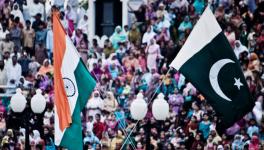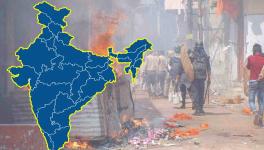Oppressive Indifference
Kashmir is again in turmoil but no one in Delhi seems to care. Prime Minister Manmohan Singh is too busy with his foreign tours, Home Minister P.Chidambaram is satisfied with his one photo-op visit to Srinagar, and the Congress party is pretty happy that the National Conference has been shown its place. The people are angry, resentful, upset but then they are just the people who have never really mattered to governments in Delhi.
Chief Minister Omar Abdullah is clearly unable to rule. He might be quite the blue- eyed politician for Delhi’s chattering classes, but in Srinagar he let a major opportunity to bridge the distance between government and the people pass by when he refused to react to the rape and murder of the two young women in Shopian. His initial reaction that they had died of drowning did grave damage, and till date Abdullah has been unable to recover from this one callous statement. Instead of reaching out, he closed all doors, with the result that the people who had received him well as the head of the state government have moved away. The result is that Omar Abdullah has been unable to expand his cabinet, and the anger of the people has virtually driven him indoors.
Congress leaders in Delhi Ghulam Nabi Azad and Saifuddin Soz are particularly happy with the mess that is being created in the state by the National Conference, the first so that he can shine in comparison, the second because he lost his cabinet berth to a belligerent Farooq Abdullah. Young Omar finds himself quite alone to handle the crisis, and has made it very clear that he does not have the capability to do so. He should have stepped out at the very beginning, ordered an enqiry, suspended the guilty security personnel pending the enquiry, moved into the crowds with sympathy and not denials, and done all that was possible to convince them that the state government was sensitive and responsive, and could be trusted now to deliver on this and all other issues. Instead he has already been bracketed as untrustworthy and it might be impossible for him to regain the peoples trust. More so, as he is more often in Delhi than Srinagar and is seen to be dependent on a coterie of advisors who do not necessarily have Kashmir’s interests at heart.
UPA-2 seems to be of the view that Jammu and Kashmir is an issue to be resolved with Pakistan, and there is little to be done indigenously. There can be no other explanation for the willful squandering of opportunity and refusal to implement the slew of pro-people measures that were recommended by working groups set up by the Prime Minister during the UPA-1 term in office. Pakistan is likely to remain involved in its own problems with the Taliban, and thereby give sufficient time to India to put in place a new relationship with the people of Jammu and Kashmir. This will have to be based on more autonomy, direct channels of communication with all sections of society, and the dispensation of quick, speedy and transparent justice.
Governments till date have placed more value on development than justice. Both are important and vital for progress, but it is important for governments to realise that for people there can be no development without justice. Development is not just growth statistics for them as it is for those ruling New Delhi, development is closely linked with security and rights. So if Omar Abdullah actually thought that he could get the support of the people by just building roads and cleaning the sewers he will have to think again, because the tragedy of Shopian has brought home a deep sense of injustice that has eclipsed the desire for roads and electricity. Security has many aspects, and justice is definitely not the least of these.
India has to learn that the sensitivities of border states, the world over, are more fragile than those living in mainland states. Jammu and Kashmir is particularly complex because of the intervention of Pakistan, and its success in internationalizing the problem as a “flashpoint”. There has been no effort by New Delhi to think the issue out, with policy changing overnight from “we will not talk on Kashmir, it is part and parcel of India” to “we will talk on Kashmir, it is one of the contested items in the composite dialogue.” Not a single official in the government of India can explain the reasons for the shift in policy, except pressure from the US on the susceptible NDA and then UPA-1 governments. The recognition of Jammu and Kashmir as a dispute with Pakistan certainly does not emerge from concern about the people of the state, for if that was so then New Delhi would have evolved and implemented policy to address their basic problems of justice and dignity. Autonomy for instance has little to do with Pakistan, it is an issue that could have been resolved between Srinagar and New Delhi a long time ago but it was not even taken up in real terms. Farooq Abdullah set up committees, but the reports are now just controversial documents that no one in power even wants to read.
Chinese President Hu Jintao reacted to the violence in one province by cutting short his visit to Italy for the G-8 summit and rushing back. He made it clear that for him his people were of the utmost importance, something that our politicians find it difficult to do. Meaningless rhetoric is always the substitute for action, and as Omar Abdullah is learning empty promises cannot fill the vacuum created by insensitive and indifferent governance. A great deal of work needs to be done in Jammu and Kashmir to overcome the propaganda of Pakistan, and now that infiltration is down and violence less, the state and central governments can set into motion confidence building measures to bridge the gap between Srinagar and Delhi, as well as between Srinagar and Jammu that has grown immeasurably over the last few years. Our governments find it more exciting to talk to Pakistan---or for that matter not to talk to Pakistan as and when the situation demands. It is time that they learnt to talk to their own people as well, and build confidence first where it counts: at home.
Get the latest reports & analysis with people's perspective on Protests, movements & deep analytical videos, discussions of the current affairs in your Telegram app. Subscribe to NewsClick's Telegram channel & get Real-Time updates on stories, as they get published on our website.
























